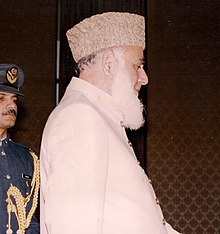رفيق تارڙ
محمد رفيق تارڙ (انگريزي ٻولي: Muhammad Rafiq Tarar) سال (1997 کان 2001) 1997 جي سپريم ڪورٽ جو جج طور رٽائر ٿيڻ بعد مسلم ليگ (ن) جي ٽڪيٽ تي سينيٽ جو ميمبر چونڊجي ويو ۽ بعد ۾ ساڳئي سال ملڪ جو صدر به ٿيو. هن جي عهدي دوران صدر جا اختيار آهستي آهستي گهٽايا ويا ۽ آخرڪار ، تيرهين ترميم ذريعي ، صدر جا اختيار مڪمل طور تي آئين جي روح ۾ گهٽائي ويا. 1999 ۾ جنرل پرويز مشرف طرفان نواز شريف جي حڪومت ختم ڪرڻ بعد ، هن کي آفيس مان نه هٽايو ويو ۽ 2001 تائين صدر رهيو.[1]
| Muhammad Rafiq Tarar | |
|---|---|
| محمد رفیق تارڑ | |
 Tarar in 2000 | |
| 9th President of Pakistan | |
| عهدو سنڀاليو 1 January 1998 – 20 June 2001 | |
| وزير اعظم | Nawaz Sharif (1998–1999) |
| Chief Executive | Pervez Musharraf (1999–2001) |
| پيشرو | Wasim Sajjad (Acting) |
| جانشين | Pervez Musharraf |
| Member of Senate of Pakistan | |
| عهدو سنڀاليو 1997–1998 | |
| جانشين | Rafique Rajwana |
| Senior Justice of the Supreme Court of Pakistan | |
| عهدو سنڀاليو 17 January 1991 – 1 November 1994 | |
| نامزد بطرف | Benazir Bhutto |
| مقرر بطرف | Ghulam Ishaq Khan |
| Chief Justice of the Lahore High Court | |
| عهدو سنڀاليو 6 March 1989 – 31 October 1991 | |
| مقرر بطرف | Tikka Khan |
| پيشرو | Abdul Shakurul Salam |
| جانشين | Mian Mahboob Ahmad |
| ذاتي تفصيل | |
| پيدائش | Muhammad Rafiq 2 نومبر 1929 Mandi Bahauddin, Punjab, British India (Now, Punjab, Pakistan) |
| وفات | 7 مارچ 2022 (عمر 92 سال) Lahore, Punjab, Pakistan |
| قوميت | Pakistani |
| سياسي جماعت | Pakistan Muslim League (N) |
| مادر علمي | Government Islamia College, Gujranwala (BA) University of the Punjab (LLB) |
| پيشو | Jurist |
| ڪابينا | Sharif Cabinet |
'''محمد رفيق تارڑ''' ( اردو:محمد رفيق تارڑ ؛ 2 نومبر، 1929ع - 7 مارچ 2022ع) هڪ پاڪستاني سياستدان ۽ قانوندان هو، جيڪو جنوري، 1998ع کان جون 2001ع ۾ استعيفيٰ ڏيڻ تائين پاڪستان جو نائين صدر رهيو، ۽ ان کان اڳ سال 1997ع ۾ پنجاب صوبي مان سينيٽر جي حيثيت سان سياست ۾ داخل ٿيڻ کان اڳ، تارڙ 1991ع کان 1994ع تائين سپريم ڪورٽ آف پاڪستان جي سينيئر جسٽس ۽ 1989ع کان 1991ع تائين لاهور هاءِ ڪورٽ جي 28هين چيف جسٽس طور خدمتون سرانجام ڏنيون.
Tarar was born in Mandi Bahauddin, and graduated with LLB from University of the Punjab in 1951, before starting practice as a lawyer in Lahore High Court the following year.[2] In 1966, he pursued a career as a jurist. Tarar later served as a justice in Pakistan's highest courts. After his retirement at 65, he started a political career as a legal advisor to Nawaz Sharif. Tarar became a senator from Punjab in 1997 and the same year nominated as presidential candidate by PML-N, but his nomination paper was rejected by the Acting Chief Election Commissioner. Barrister Ijaz Husain Batalvi assisted by M. A. Zafar and Akhtar Aly Kureshy Advocate, challenged his rejection in Lahore High Court and the Full Bench set aside the rejection order of the Election Commission[3] and he was elected president of Pakistan in the presidential election by a margin of 374 out of 457 votes of the Electoral College.[4]
Tarar assumed office in January 1998 with heavy criticism by opposition especially from former Prime Minister Benazir Bhutto who accused him of illegally legitimizing dismissal of her government as a judge of the Supreme Court of Pakistan. As head of state, Tarar shifted Pakistan's system of government from semi-presidential system to parliamentary democratic system by signing the Thirteenth Constitutional Amendment. He surrendered his reserve power of dismissing the Prime Minister, triggering new elections and dissolving the National Assembly. He also signed the Fourteenth and Fifteenth amendment to the constitution that limited the powers of the presidency from executive to a figurehead.[5]
Tarar resigned as President in 2001 in the wake of the 1999 Pakistani coup d'état.[6] He resisted and did not endorse the 12 October 1999 military coup. He was forced to step down by then Chief Executive Pervez Musharraf and ultimately succeeded by Musharraf through a referendum held in 2002.[7] Twenty months after seizing power in a coup, General Musharraf took the head of state's oath and became the fourth military ruler to become president.[8]
حوالا
سنواريو- ↑ "Tarar sworn in as Pakistani president". BBC News. 1 January 1998. http://news.bbc.co.uk/2/hi/43645.stm.
- ↑ "Rafiq Tarar's Academic career". وقت 20 October 2019 تي اصل کان آرڪائيو ٿيل. حاصل ڪيل 26 October 2019. Unknown parameter
|url-status=ignored (مدد) - ↑ "BBC News | Despatches | Court rules in favour of Pakistan President".
- ↑ "Previous Presidents: Mr. Muhammad Rafiq Tarar". Presidency of the Islamic Republic of Pakistan. وقت 25 April 2013 تي اصل کان آرڪائيو ٿيل. حاصل ڪيل 9 May 2013. Unknown parameter
|url-status=ignored (مدد) - ↑ 12th Parliament of Pakistan (1973). Constitution of the Islamic Republic of Pakistan (13th Amendment ed.). 12th Parliament of Pakistan.
- ↑ "Tarar claims he is still president". وقت 19 October 2019 تي اصل کان آرڪائيو ٿيل. حاصل ڪيل 19 October 2019. Unknown parameter
|url-status=ignored (مدد) - ↑ Reddy, B. Muralidhar (21 June 2001). "Rafiq Tarar forced to quit?". The Hindu. http://www.thehindu.com/2001/06/21/stories/01210002.htm.
- ↑ "Coup chief declares himself president". وقت 21 October 2019 تي اصل کان آرڪائيو ٿيل. حاصل ڪيل 21 October 2019. Unknown parameter
|url-status=ignored (مدد)